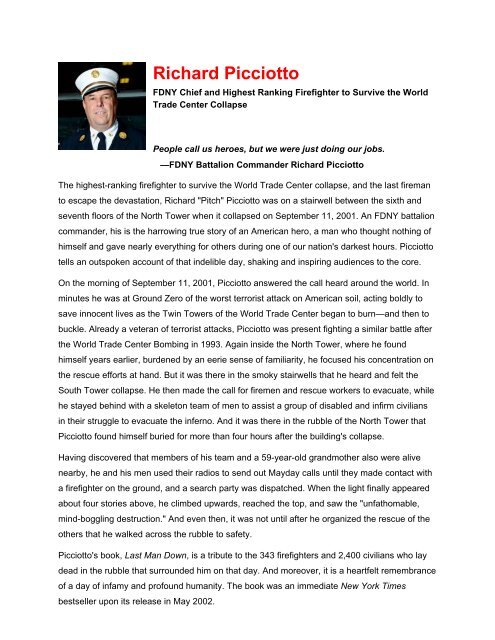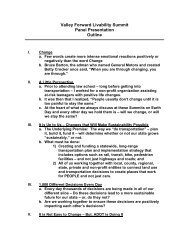Richard Picciotto
Richard Picciotto - Valley Forward
Richard Picciotto - Valley Forward
- No tags were found...
Create successful ePaper yourself
Turn your PDF publications into a flip-book with our unique Google optimized e-Paper software.
<strong>Richard</strong> <strong>Picciotto</strong><br />
FDNY Chief and Highest Ranking Firefighter to Survive the World<br />
Trade Center Collapse<br />
People call us heroes, but we were just doing our jobs.<br />
—FDNY Battalion Commander <strong>Richard</strong> <strong>Picciotto</strong><br />
The highest-ranking firefighter to survive the World Trade Center collapse, and the last fireman<br />
to escape the devastation, <strong>Richard</strong> "Pitch" <strong>Picciotto</strong> was on a stairwell between the sixth and<br />
seventh floors of the North Tower when it collapsed on September 11, 2001. An FDNY battalion<br />
commander, his is the harrowing true story of an American hero, a man who thought nothing of<br />
himself and gave nearly everything for others during one of our nation's darkest hours. <strong>Picciotto</strong><br />
tells an outspoken account of that indelible day, shaking and inspiring audiences to the core.<br />
On the morning of September 11, 2001, <strong>Picciotto</strong> answered the call heard around the world. In<br />
minutes he was at Ground Zero of the worst terrorist attack on American soil, acting boldly to<br />
save innocent lives as the Twin Towers of the World Trade Center began to burn—and then to<br />
buckle. Already a veteran of terrorist attacks, <strong>Picciotto</strong> was present fighting a similar battle after<br />
the World Trade Center Bombing in 1993. Again inside the North Tower, where he found<br />
himself years earlier, burdened by an eerie sense of familiarity, he focused his concentration on<br />
the rescue efforts at hand. But it was there in the smoky stairwells that he heard and felt the<br />
South Tower collapse. He then made the call for firemen and rescue workers to evacuate, while<br />
he stayed behind with a skeleton team of men to assist a group of disabled and infirm civilians<br />
in their struggle to evacuate the inferno. And it was there in the rubble of the North Tower that<br />
<strong>Picciotto</strong> found himself buried for more than four hours after the building's collapse.<br />
Having discovered that members of his team and a 59-year-old grandmother also were alive<br />
nearby, he and his men used their radios to send out Mayday calls until they made contact with<br />
a firefighter on the ground, and a search party was dispatched. When the light finally appeared<br />
about four stories above, he climbed upwards, reached the top, and saw the "unfathomable,<br />
mind-boggling destruction." And even then, it was not until after he organized the rescue of the<br />
others that he walked across the rubble to safety.<br />
<strong>Picciotto</strong>'s book, Last Man Down, is a tribute to the 343 firefighters and 2,400 civilians who lay<br />
dead in the rubble that surrounded him on that day. And moreover, it is a heartfelt remembrance<br />
of a day of infamy and profound humanity. The book was an immediate New York Times<br />
bestseller upon its release in May 2002.
Chief <strong>Picciotto</strong> is also a former New York City police officer, and has served as a fire marshal,<br />
an arson investigator, a lieutenant, and a captain prior to becoming chief in 1992. He is a 28-<br />
year veteran of the FDNY, and for the past nine years, he has presided over the department's<br />
Battalion 11, covering Manhattan's Upper West Side. He is the recipient of departmental awards<br />
and commendations for his bravery and meritorious service.






